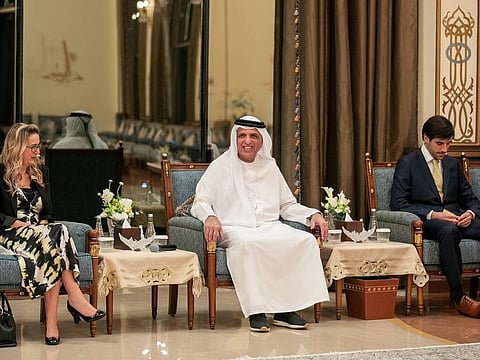Passion for giving, dedication, charity deeply-rooted in UAE society: RAK Ruler
Impact of charitable works in promoting the culture of giving highlighted

Ras Al Khaimah: His Highness Sheikh Saud bin Saqr Al Qasimi, Supreme Council Member and Ruler of Ras Al Khaimah, has affirmed that charitable works that seek to build human capacities play an effective role in the development of communities and communication among their members based on noble objectives and values.
Sheikh Saud made the remarks as he received on Thursday at his palace in the Saqr City participants in the conference titled "Private Philanthropy for Development in the MENA'', jointly organised by Sheikh Saud Bin Saqr Al Qasimi Foundation for Policy Research in collaboration with the Organisation for Economic Co-operation and Development (OECD) Network of Foundations Working for Development (netFWD) and the Pearl Initiative.
Sheikh Saud exchanged views with the participants on the impact of charitable works in promoting the culture of giving and charity.
Passion for giving, dedication and charity are deeply-rooted and permanent values in the UAE society, he added.
The two-day event in Ras Al Khaimah aims to support worldwide demand for more and improved data and analysis on global philanthropy for development. Through in-depth research and state-of-the-art analysis, the initiative will support the UAE's 2030 Agenda and help philanthropists achieve a positive impact despite worldwide challenges.
Data, dialogue
The discussions focused on building effective philanthropic communities across the region, drawing opinion from philanthropists and experts from the non-profit sector to promote improved data and dialogue.
The opening session titled "Building philanthropic communities in the MENA region" featured Huda Alkhamis-Kanoo, Founder of Abu Dhabi Music & Arts Foundation, Badr Jafar, CEO of Crescent Enterprises and Founder of Pearl Initiative, and Hana Shahin, Executive Director of King Hussein Foundation.
Boosting impact of giving
The discussion highlighted the importance of collaboration through sharing experiences and co-financing initiatives based on mutual objectives and the growing demand for transparency, accountability, and measurability in philanthropic giving across the region.
In an engaging discussion on the need for philanthropic impact to be supported by data, Badr Jafar said, "It is estimated that more than $5 trillion of wealth in the top 30 growing economies which are all in growth markets like the Middle East will be passed from one generation to the next within the next decade.
"There will inevitably be a significant increase in philanthropic activities in these societies, which underlines the need for enhanced mechanisms and means to give to boost impact."
No shortage of philanthropists
Acknowledging the philanthropic behavioural shifts in the Middle East, with next-gen donors demanding more transparency and wanting to feel more connected to their giving, Badr Jafar was optimistic that this natural trend would continue to increase throughout the region.
He commented, "There is no shortage of new philanthropists eager to make a social impact with their capital in the region. By working together as individual philanthropists, corporate and institutional donors, we can remain focused on the strategic deployment of philanthropic capital to deliver lasting results for all. "
Alongside the panel discussions, a roundtable explored the strategies adopted by various foundations to provide stakeholders with additional knowledge banks and resources to draw upon. Learning included examining the efforts of some philanthropists in the region in order to benefit from the coordination of data and dialogue to achieve more impactful philanthropy.
Up to $1 trillion is disbursed annually between Zakat, Sadaqa
Badr Jafar called on all stakeholders to undertake transparent, innovative, and impactful philanthropic initiatives to benefit the region, emphasising: "We have a long history of charitable giving in the MENA region and the broader Islamic world.
"Today, anywhere between $400 billion to $1 trillion is disbursed annually between Zakat and Sadaqa, which is triple the global annual humanitarian and development aid budgets. With all the challenges being faced, we really need to to ensure we maximise our giving impact by effectively building a closer community of philanthropic donors to share knowledge, experience and purpose."
The two-day event in Ras Al Khaimah aims to support worldwide demand for more and improved data and analysis on global philanthropy for development.
Through in-depth research and state-of-the-art analysis, the initiative will support the UAE's 2030 Agenda and help philanthropists achieve a positive impact despite worldwide challenges.


